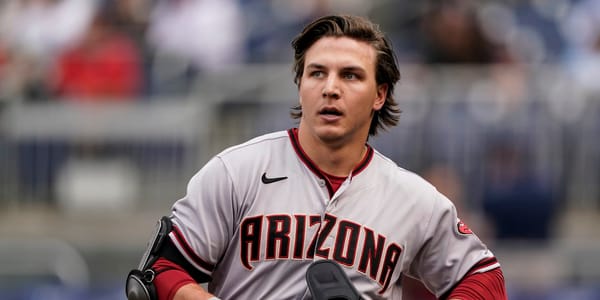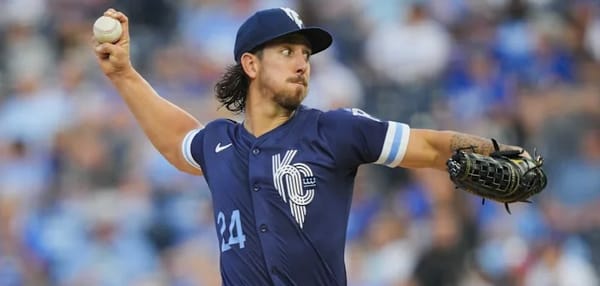Warren Schaeffer has said he wants the Rockies to “play free,” but what does that mean?
It’s all about creating a positive learning environment.
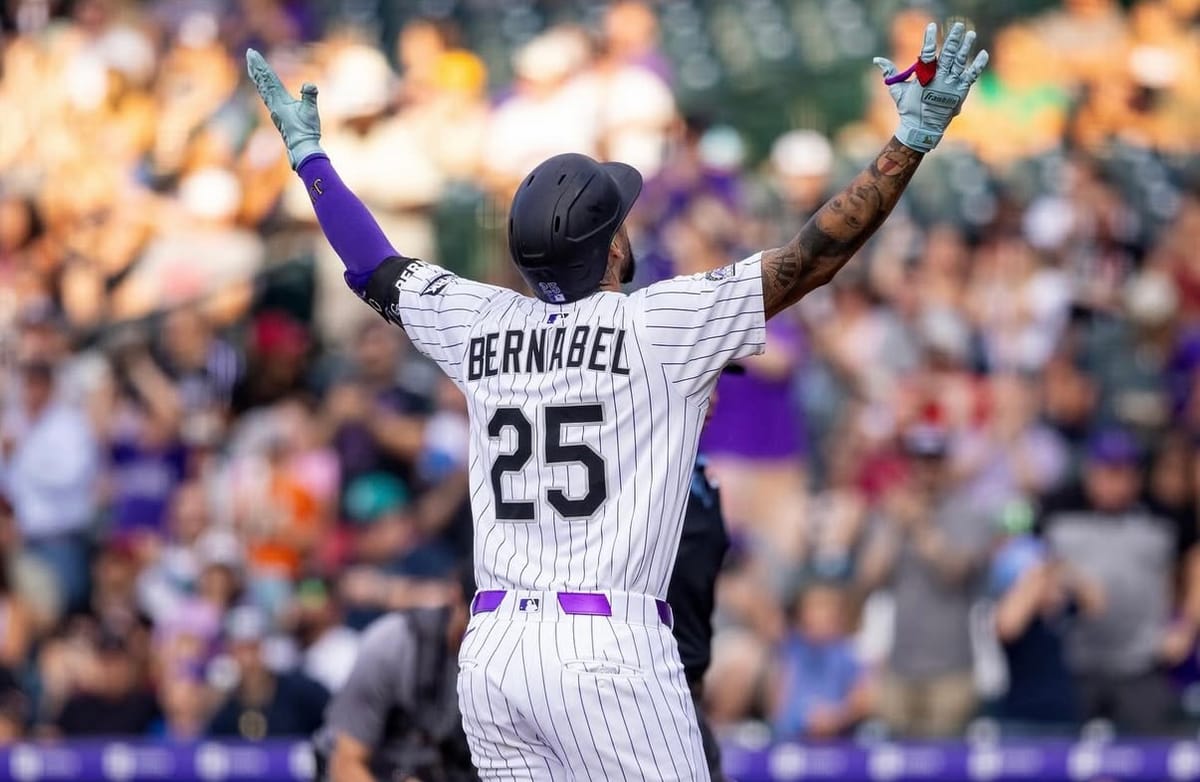
Back in May when the Colorado Rockies interim manager Warren Schaeffer held his first presser, he said something I’ve been trying to understand:
Warren Schaeffer:
— Renee Dechert (@reneedechert.com) 2025-08-19T16:44:09.193Z
Here’s what Schauffeur told Ryan Spilborghs about his managerial style:
I just want them to play loose. You know, from from my from my vantage point, we have a fresh start. They've been playing tight, in general, young players playing tight. I want the young players to come up and feel like they're a part of something immediately when they get here. And I believe that when you play loose, the fundamentals get better, and all the stuff that you practice can show itself.
What did that mean, “playing loose” and “playing tight?”
Back in late May, I asked Schaeffer to describe how he would measure progress in what would clearly be a season of player development. He said then, “These are all learning experiences where we want to see the standard upheld every day more and more as we go. I want this team to look different in July than it does June and August. Hopefully we see that progression, but the standard never changes. The standard is extremely high.”
Clearly, the Rockies have played better under Schaeffer’s stewardship. In 2025, they went 7-33 (.175 W-L%) under Bud Black and 30-58 (.345 W-L%) with Schaeffer at the helm.
Since the All-Star Break, that trend has continued. For example, the Rockies are third in batting average (.272), fifth in slugging percentage (.452) and total bases (476), and sixth in OPS (.771). (For a more detailed analysis on the Rockies improvements, I recommend this from Joelle Milholm.)
To be clear, this is still not a good baseball team, but it’s better than it was in May. (If nothing else, that team would not have earned a series split against the Los Angeles Dodgers.)
This improvement perhaps means that the Rockies are playing “loose,” but I remained unclear about what the term meant. So I asked again.
Here’s how Schaeffer explained it earlier this month, and his answer is worth quoting at length.
For instance, like last night, we made a bunch of mental mistakes. We talked to Warming [Bernabel] about his [mistakes]. Last night we talked to Yankee [Yanquiel Fernández] about his [mistakes].
These are young players where, if they make mental mistakes, which you expect that they're going to do that, there has to be a level of patience.
But when they're corrected, you have to trust and give them the directive that this is what you've done wrong. I don't want you to go out there and play “tight” and feel like you can't make another mistake. I want you to know what you did wrong, fix it, move forward, and play free and don't worry about me.
It's not beating-them-up-over-the-head-over stuff. It's learning and moving forward and seeing results like we had this past series [with the Pittsburgh Pirates], where if you're playing tight, you can't come back from nine to nothing. You can't come back from four to nothing. You just do it in a box, and nothing works when you're tight.
So just playing free and believing in each other.
I don't know. It's tough to explain. You just to kind of have to look and see what you saw this pretty much whole second half. You’ve seen the majority of guys playing free, in my opinion.
As a teacher, I understand what Schaeffer is staying, and it’s a widely accepted teaching strategy: Have high standards; correct players when they make mistakes but without undercutting their confidence; allow them to play again and correct the error when placed in a similar situation, which builds more skills and confidence.
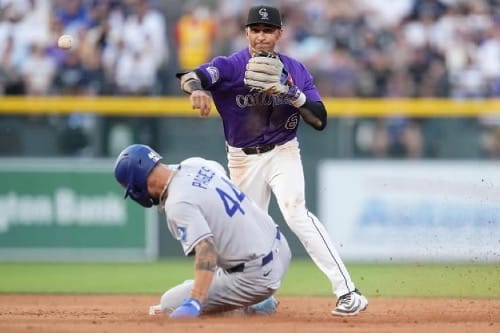
Compare that, then, to what we know about Bud Black’s approach to coaching as explained to Sam Bradfield:
“I think playing time is earned over time in a lot different ways, a lot of different auditions. Whether it’s spring training; whether it’s minor leagues and minor league production; whether it’s major league performance/minor league performance; evaluations from minor league evaluators, minor league coaches, managers, what they see from young players and forecasting what they’ll do at the major league level based on what they see at the minor league level.
“I think there are steps to be taken — being put on the 40 man roster, being in big league camp, becoming accustomed to the big league setting, all those things come into play. How they mentally and emotionally handle a big league game, a big league setting, conversations with them...there’s a lot of indicators that tell you when it’s their time.”
Black’s notion of “earning” playing time strikes me as fundamentally different that Schaeffer’s approach in that Black’s approach does not make space for “a level of patience.” A player either produces, or he doesn’t.
I was reminded of players who were called up, given irregular playing time, failed, and were sent back to Albuquerque — Elehuris Montero provides a case in point. He was not given regular playing time, he became nervous in game situations, and he ultimately failed in the Rockies system. Similarly, Yonathan Daza and Raimel Tapia were mishandled — I could go on.
And don’t forget José Mujica’s Rockies debut. On September 8, 2020, he was brought into a game with the bases loaded and promptly allowed Wil Myers to hit a grand slam. Mujica was the first player in MLB history to allow a grand slam to their first career hitter. He went on to pitch 2.2 innings while allowing seven runs (six earned) on eight hits with two walks and one strikeout.
That hardly seems like a situation that would set a player up for success.
In thinking back over Black’s time as manager, I could see some young players playing “tight” and growing less confident as they worried about being sent back to Triple-A.
Just to be clear, that’s not to say all of these players’ issues were the result of decisions made by Bud Black. Obviously, the Rockies have significant player development problems throughout their system. But at the end of the day, Black served as the ultimate MLB gatekeeper for the Rockies’ prospects.
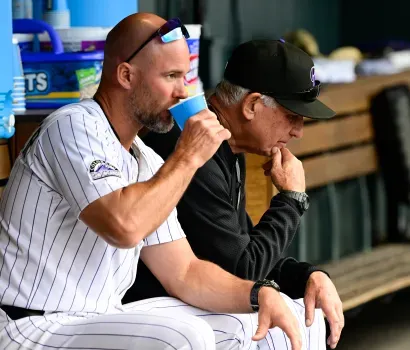
Schaeffer’s approach seems better, certainly for young players today. He relies on clear communication, makes sure players know they have his support, and lets them play rather than expecting them to “earn it.” For Schaeffer, that has already happened with their promotion to MLB; his job is to help them to succeed.
That leads to an obvious question: Should he get the job as the Rockies’ permanent manager? I don’t know.
I am certain Schaeffer is the right person for this team at this moment. His Triple-A approach to baseball has allowed this young Rockies team to grow and progress. But I have wondered if his approach would work with teams like, say, the Philadelphia Phillies or the New York Yankees. Those teams have effective player-development systems and All-Star veteran players. Schaeffer, on the other hand, finds himself coaching young players who have been largely failed by the Rockies ineffective developmental system.
Players routinely compliment Schaeffer on his communication and teaching. Those are no small things for a team that will have an entry on the list of historically bad baseball teams. Schaeffer, though, does not allow the team to focus on that, and the players don’t. They play hard for each other, viewing the second half as a new start, and they are resilient.
From the Rockies game notes: The Colorado Rockies executed their fourth five-run comeback win of the season, scoring two in the seventh and six in the eighth. Their four comeback wins after trailing by five-plus runs are the most in the Majors
— Renee Dechert (@reneedechert.com) 2025-08-17T03:37:45.151Z
Say what you want about the 2025 Colorado Rockies, but this team does not quit, and in a season like this one — in the dog days of August, no less — that’s significant.
Now we wait to see Dick Monfort’s vision for this team going forward. Will he continue on this path or try something else?
Stay tuned.
What I’m Reading
- BSB Top 50: Honorable mentions | Blake Street Banter — The folks at Blake Street Banter have begun their prospect-ranking series. Here are the first results.
- Griffin Herring is adjusting to a new team and a new coast | Purple Row — Eva Lang spoke with one of the newest Rockies. Herring describes, among other things, what it’s like to be traded and move across country.
- Karros' 1st HR comes with dad Eric in the house: “He'll get another invite” | MLB.com — This was probably my favorite story of the week.
- This one is worth sharing
Closing Thoughts
And that’s it for this week.
I thought the Rockies would be lucky to win a single game against the Dodgers. Instead, they earned a split, which is pretty good, especially for this team.
But now they go on the road, first to Pittsburgh, a place where they have never played well, and then to Houston, a brutal environment for them.
Still, this is a plucky bunch, so perhaps they’ll surprise us.
As always, thanks for reading —
Renee
Rockies Pitch is a newsletter that focuses on Colorado Rockies baseball.
Find me on Bluesky at @ReneeDechert.com or send an email to Renee@RockiesPitch.com.



